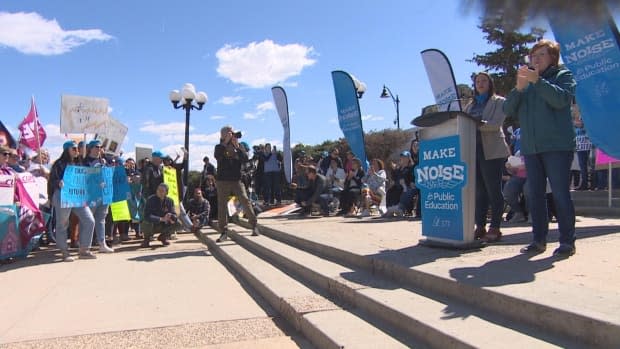'You've been heard': Sask. premier says province will provide more money for classrooms

"You've been heard."
Premier Scott Moe spoke those words Monday afternoon at the Saskatchewan legislature when asked for his response to a rally organized by the Saskatchewan Teacher's Federation (STF) on Saturday.
The rally for public education drew a crowd of more than 3,500 people, according to the STF. They demanded the Government of Saskatchewan increase funding for classrooms.
Teachers are calling for more money to keep up with inflation, enrolment and the complex needs of some students. Premier Moe said more funding is coming, specifically to address enrolment pressures in Regina and Saskatoon classrooms, but did not say exactly when.
"Although I don't know when we would make that announcement … going into the fall we most certainly want the funds to be available for that planning that needs to happen," Moe said.
"We're going to work as expeditiously as we can, but we need to sit down and and continue to work alongside the school divisions."

Minister of education on rally
Minister of Education Dustin Duncan appeared on CBC's The Morning Edition with host Stefani Langenegger Monday morning to discuss the calls for funding. Duncan did not attend the rally.
He said teachers were focused on securing a salary increase.
"Keep in mind the largest inflationary pressure, single inflationary pressure for school divisions … the single largest driver is the teachers' contract. That's their biggest single expense," Duncan said.
"We have a contract that's ending with the teachers … in August. And so they're motivated, obviously, to show their support for their sector and so, you know, I wasn't surprised at that."
Listen to Minister of Education Dustin Duncan's full interview:
Andrew Stevens, a business professor at the University of Regina who specializes in labour relations, said wage increases are certainly part of what the STF wants, but that working conditions for teachers are also learning conditions for students.
"I think it's critically important that organized labour thinks about the public well-being front and centre and not just securing wage increases. And frankly, as someone who was there, I saw a real concern for the general well-being of students and the knowledge economy in Saskatchewan," said Stevens, who is also a Regina city councillor.
But Stevens said the STF needs to be clear going forward about exactly what it wants to see in education budgets.
Opposition NDP Leader Carla Beck was also at the rally. She said she welcomes the commitment to an in-year adjustment for school divisions, but that the problems with education funding are deeper than a one or two-year adjustment.
"Here's the question I would put to the premier [and] the education minister: 'Do we want our kids to have the best education we can provide for them?' And then work back from there on what that's going to cost," Beck said.
The NDP leader said the government needs to make impactful changes to how much school divisions receive annually. She said divisions have had to make cuts in recent years due to underfunding.
Immigration pushing enrolment
Duncan said the province already increased the operational education budget for 2023/24 by $49.4 million, bringing the total to $2.04 billion. He said there is other funding for infrastructure, including money for a new distance learning centre that he said will save school divisions about $13 million this year.
The STF said in a news release on Monday that Duncan's claim is inaccurate. It said that funding follows the student and, therefore, there is no cost saving to divisions.
"Ignoring the reality in schools and dodging questions will not make the problems go away. The fact remains that students are being short-changed. Refusing to properly fund public education is a deliberate and political choice by this government," said STF President Samantha Becotte in the release.
"Our province has the money to invest in students. Elected officials are simply choosing not to."

Duncan also suggested that the model of setting enrolment projections in January, building the budget in March, and then reconciling it in September may not work anymore.
He said post-COVID immigration is a large driver in enrolment increases.
"Are we seeing more students arriving throughout the school year as a reflection of the fact that COVID delayed immigration? Are we going to work our way through this in a couple of years, or is this going to be an ongoing trend?"
Moe said the province is experiencing unprecedented population growth driven by unprecedented growth in the economy.
"People are moving here, they're bringing their their children here. Those children are are going into our schools," Moe said.
"So the traditional way in which we have ascertained or received the estimates from the divisions on what our student population growth is going to be over the course of the next year just isn't reacting quickly enough to what we're actually seeing in practice over the course of the last couple of years."

Student support needs
The STF said there are not enough social workers or psychologists in schools. According to the STF, there's one psychologist for every 2,800 students, one speech and language pathologist for every 1,300 students and one social worker for every 2,900 students.
The STF is calling for previous education cuts by the government to be reversed.
In Monday's press release, the STF included data from the Ministry of Education's education sector staffing profile. It said that from the 2017-18 to 2021-22 school years, there was a reduction in professionals who support students other than classroom teachers, all while student enrolment grew:
A 13.5 per cent reduction in English as an additional language teachers.
A 16.2 per cent reduction in teacher counsellors.
A 64.5 per cent reduction in teacher-librarians.
A five per cent reduction in school counsellors.
A six per cent reduction in teacher-co-ordinators.
A 2.1 per cent reduction in speech language pathologists.


